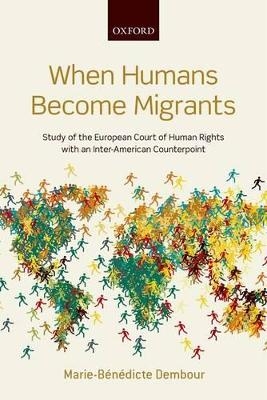
When Humans Become Migrants
Study of the European Court of Human Rights with an Inter-American Counterpoint
Seiten
2015
Oxford University Press (Verlag)
978-0-19-966784-0 (ISBN)
Oxford University Press (Verlag)
978-0-19-966784-0 (ISBN)
The issue of migration presents clear challenges to international human rights courts due to its political sensitivity. This book contrasts the European and Inter-American Courts of Human Rights, showing how their rulings differ on this issue. It argues that the Inter-American Court's approach is more sympathetic to the individuals involved.
The treatment of migrants is one of the most challenging issues that human rights, as a political philosophy, faces today. It has increasingly become a contentious issue for many governments and international organizations around the world. The controversies surrounding immigration can lead to practices at odds with the ethical message embodied in the concept of human rights, and the notion of 'migrants' as a group which should be treated in a distinct manner. This book examines the way in which two institutions tasked with ensuring the protection of human rights, the European Court of Human Rights and Inter-American Court of Human Rights, treat claims lodged by migrants. It combines legal, sociological, and historical analysis to show that the two courts were the product of different backgrounds, which led to differing attitudes towards migrants in their founding texts, and that these differences were reinforced in their developing case law.
The book assesses the case law of both courts in detail to argue that they approach migrant cases from fundamentally different perspectives. It asserts that the European Court of Human Rights treats migrants first as aliens, and then, but only as a second step in its reasoning, as human beings. By contrast, the Inter-American Court of Human Rights approaches migrants first as human beings, and secondly as foreigners (if they are). Dembour argues therefore that the Inter-American Court of Human Rights takes a fundamentally more human rights-driven approach to this issue. The book shows how these trends formed at the courts, and assesses whether their approaches have changed over time. It also assesses in detail the issue of the detention of irregular migrants. Ultimately it analyses whether the divergence in the case law of the two courts is likely to continue, or whether they could potentially adopt a more unified practice.
The treatment of migrants is one of the most challenging issues that human rights, as a political philosophy, faces today. It has increasingly become a contentious issue for many governments and international organizations around the world. The controversies surrounding immigration can lead to practices at odds with the ethical message embodied in the concept of human rights, and the notion of 'migrants' as a group which should be treated in a distinct manner. This book examines the way in which two institutions tasked with ensuring the protection of human rights, the European Court of Human Rights and Inter-American Court of Human Rights, treat claims lodged by migrants. It combines legal, sociological, and historical analysis to show that the two courts were the product of different backgrounds, which led to differing attitudes towards migrants in their founding texts, and that these differences were reinforced in their developing case law.
The book assesses the case law of both courts in detail to argue that they approach migrant cases from fundamentally different perspectives. It asserts that the European Court of Human Rights treats migrants first as aliens, and then, but only as a second step in its reasoning, as human beings. By contrast, the Inter-American Court of Human Rights approaches migrants first as human beings, and secondly as foreigners (if they are). Dembour argues therefore that the Inter-American Court of Human Rights takes a fundamentally more human rights-driven approach to this issue. The book shows how these trends formed at the courts, and assesses whether their approaches have changed over time. It also assesses in detail the issue of the detention of irregular migrants. Ultimately it analyses whether the divergence in the case law of the two courts is likely to continue, or whether they could potentially adopt a more unified practice.
Marie-Bénédicte Dembour is Professor of Law and Anthropology at the University of Brighton. She was previously at the University of Sussex. She has been a visiting scholar/tutor/Professor at various European institutions, including the Free University of Amsterdam, the Free University of Brussels and the University of Oxford. When Humans Become Migrants was written with the support of a Leverhulme Major Research Fellowship.
PART I: FOUNDATIONS; PART II: CONSOLIDATION; PART III: PROSPECTS
| Verlagsort | Oxford |
|---|---|
| Sprache | englisch |
| Maße | 178 x 234 mm |
| Gewicht | 860 g |
| Themenwelt | Recht / Steuern ► EU / Internationales Recht |
| Recht / Steuern ► Öffentliches Recht ► Völkerrecht | |
| Sozialwissenschaften ► Politik / Verwaltung | |
| Sozialwissenschaften ► Soziologie | |
| ISBN-10 | 0-19-966784-5 / 0199667845 |
| ISBN-13 | 978-0-19-966784-0 / 9780199667840 |
| Zustand | Neuware |
| Haben Sie eine Frage zum Produkt? |
Mehr entdecken
aus dem Bereich
aus dem Bereich


